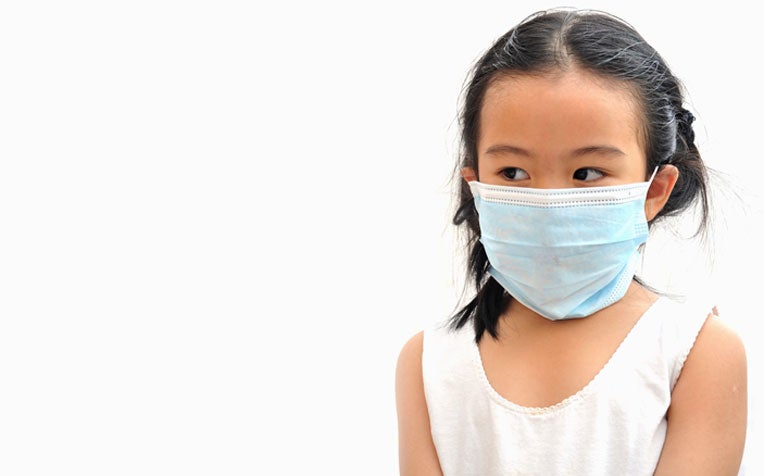
Children are especially at risk during a haze because their immune system is still immature.
Are you concerned about the impact of the haze in Singapore on the health of your children? Then you should limit the time they spend outdoors, as well as keep the doors and windows closed at home to help prevent the haze from getting indoors when the PSI levels are in the unhealthy range (i.e. >100).
“Young children, especially those with underlying lung or heart conditions, should minimise prolonged or strenuous outdoor activities if PSI levels exceed 100” says Adj Asst Prof Biju Thomas, Senior Consultant, Respiratory Medicine Service, KK Women’s and Children’s Hospital (KKH), a member of the SingHealth group.
During a haze period, children are especially at risk because their immune system and lung defence mechanisms are still immature.
What are the ill effects of the haze on children?
Acute exposure to the haze can harm the nose, lungs and eyes in otherwise healthy children and result in the following symptoms:
- Itchy, watery or red eyes
- Runny nose
- Blocked nose
- Sneezing
- Dry/sore throat
- Dry irritant cough
- Breathing difficulty
- Reduced tolerance to exercise
“Children who are exposed to the haze and experience any of these symptoms in their milder forms, should recover on their own in time if they limit their ongoing exposure to the haze. However, if the symptoms persist or are troublesome, they should seek medical help,” says Adj Asst Prof Thomas.
In children with a pre-existing medical condition such as asthma, allergic rhinitis and allergic conjunctivitis, the symptoms listed above may present in a more severe form. They may also experience an exacerbation of their medical condition, e.g. children with asthma may suffer an asthma attack that requires emergency medical attention or hospitalisation. Children with allergic rhinitis may have a flare-up of their allergic rhinitis symptoms with their nose becoming blocked, itchy and/or runny.
Precautions to keep children safe during the haze in Singapore
- Minimise prolonged or strenuous outdoor activities* at PSI levels above 100
- Minimise outdoor activitie if PSI levels reach higher than 200
- Avoid all outdoor activities if PSI levels reach higher than 300.
- Keep doors and windows closed at home when the PSI levels are high.
- If using an air conditioner, clean the filters regularly and ensure that they are in good working order.
- Ensure children drink plenty of fluids and stay well hydrated.
When in doubt, follow the Health Advisory available on the National Environment Agency / Ministry of Health websites.
* Minimise outdoor activity = Allows for regular travel from one building to another e.g. home to shopping mall, school, but outdoor activities would not be advocated e.g. strolling in parks.
Extra precautions for children with pre-existing medical conditions
- Children with pre-existing lung and heart conditions should have their regular medications as advised by their doctor
- Children with pre-existing lung and heart conditions should see a doctor immediately if they become unwell or experience worsening of their symptoms
- Children with asthma should follow their asthma action plan if the PSI is high (>100) and they experience asthma symptoms (cough, wheezing or shortness of breath)
Are N95 masks and surgical masks suitable for children?
“These masks are made to create a seal around the mouth and nose of the user so particles cannot get in. Many of the available N95 masks may not fit tightly on the face of a child so they may not be as effective as in an adult with a correctly fitted mask,” says Adj Asst Prof Thomas.
There are currently no international certification standards for use of masks in children. For more information, please visit the MOH website on FAQs on haze health here.
Surgical masks may not offer adequate protection from the harmful particulate matter present in the haze, as these masks are not designed to achieve a firm fit on the person’s face. The harmful particulate matter in the haze is very small (2.5 microns or less) and the normal surgical masks are not effective in filtering such fine particles. There is usually some gap between the surgical mask and the face, through which the haze particles may easily get in. They may reduce the discomfort caused by haze by providing a barrier between the wearer’s nose and mouth, and larger irritant particles in the air.
Masks do not need to be worn indoors.
“Typically, the ill effects of acute exposure to the haze will be transient and temporary if your child is otherwise healthy,” says Adj Asst Prof Thomas. “Long-term adverse effects on health usually will not occur unless there is prolonged and intense exposure to air pollution over many months or years.”
For more information on the haze, please visit www.haze.gov.sg
Ref: N18
Check out our other articles about haze and air pollution:
How Adults Can Minimize Harm from the Haze
Contributed by















 Get it on Google Play
Get it on Google Play